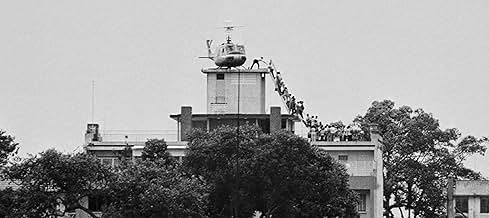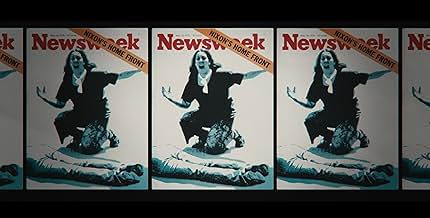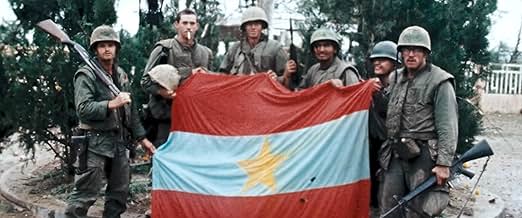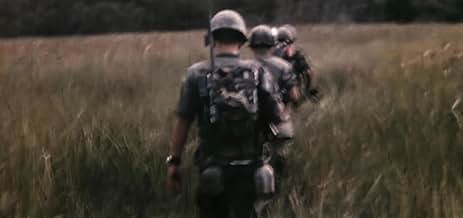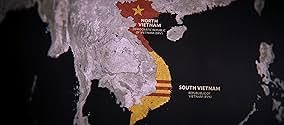Turning Point: La guerre du Vietnam
Original title: Turning Point: The Vietnam War
- TV Mini Series
- 2025
- 1h 15m
The Vietnam War's profound effects on American identity, causing social division and eroding government trust. More than military defeat, it transformed US politics and culture.The Vietnam War's profound effects on American identity, causing social division and eroding government trust. More than military defeat, it transformed US politics and culture.The Vietnam War's profound effects on American identity, causing social division and eroding government trust. More than military defeat, it transformed US politics and culture.
Browse episodes
Featured reviews
As a British Army veteran with a longstanding interest in the Vietnam War, I approached Turning Point: Vietnam with the hope that it would offer a rich, balanced perspective on one of the most politically and morally complex conflicts of the 20th century. Unfortunately, what unfolds is a disappointingly narrow and overly Americanised narrative, filtered through a distinctly modern lens.
This series seems more interested in drawing parallels with today's ideological and cultural debates than offering a sober, historically accurate examination of the war itself. It applies 21st-century sensibilities to 20th-century geopolitics, and in doing so, misses the nuance, context, and texture that this subject demands. It felt less like a documentary and more like a vessel for contemporary messaging-at times bordering on revisionist history.
What's particularly jarring is the near-total absence of Vietnamese voices, both from the North and the South. The conflict, after all, was fought on their soil, among their people, and with devastating impact. The series gives little space to understanding the motivations of the North Vietnamese or Viet Cong beyond standard Cold War tropes, and barely touches on the tragedy of South Vietnam's fall. There's a living history here that is fading fast, yet the documentary doesn't seem interested in preserving or exploring it.
Likewise, Australia-America's most significant ally in the conflict outside of South Vietnam-is not mentioned at all. Over 60,000 Australians served in the war, with more than 500 killed. Their absence from this series further underscores the US-centric lens through which the entire conflict is portrayed. There's also scant reference to other contributing nations, such as South Korea, Thailand, or the Philippines, nor any deep analysis of the international ramifications of the war on post-colonial Asia.
The Vietnam War was never just a 'bad chapter' in American history, it was a global flashpoint, the culmination of colonial collapse, Cold War paranoia, and regional resistance movements. Any serious documentary on the subject should strive to examine not just what happened, but why, from all angles.
In the end, Turning Point, Vietnam feels like a missed opportunity. At a time when first-hand accounts are still possible, and when global perspectives are more accessible than ever, this series retreats into a familiar, overly simplified narrative. It does a disservice not only to viewers but also to the complexity-and humanity-of those who lived through the war on all sides.
This series seems more interested in drawing parallels with today's ideological and cultural debates than offering a sober, historically accurate examination of the war itself. It applies 21st-century sensibilities to 20th-century geopolitics, and in doing so, misses the nuance, context, and texture that this subject demands. It felt less like a documentary and more like a vessel for contemporary messaging-at times bordering on revisionist history.
What's particularly jarring is the near-total absence of Vietnamese voices, both from the North and the South. The conflict, after all, was fought on their soil, among their people, and with devastating impact. The series gives little space to understanding the motivations of the North Vietnamese or Viet Cong beyond standard Cold War tropes, and barely touches on the tragedy of South Vietnam's fall. There's a living history here that is fading fast, yet the documentary doesn't seem interested in preserving or exploring it.
Likewise, Australia-America's most significant ally in the conflict outside of South Vietnam-is not mentioned at all. Over 60,000 Australians served in the war, with more than 500 killed. Their absence from this series further underscores the US-centric lens through which the entire conflict is portrayed. There's also scant reference to other contributing nations, such as South Korea, Thailand, or the Philippines, nor any deep analysis of the international ramifications of the war on post-colonial Asia.
The Vietnam War was never just a 'bad chapter' in American history, it was a global flashpoint, the culmination of colonial collapse, Cold War paranoia, and regional resistance movements. Any serious documentary on the subject should strive to examine not just what happened, but why, from all angles.
In the end, Turning Point, Vietnam feels like a missed opportunity. At a time when first-hand accounts are still possible, and when global perspectives are more accessible than ever, this series retreats into a familiar, overly simplified narrative. It does a disservice not only to viewers but also to the complexity-and humanity-of those who lived through the war on all sides.
I really enjoy this kind of documentary, especially because its length - over five hours - allows it to take its time and properly explore a story from as many angles as possible.
What struck me most, personally, was that I ended up feeling sympathy and even a kind of sorrow for both sides. The filmmaker makes a real effort to stay as neutral as possible, showing the motivations - and especially the suffering - on both sides of the conflict.
One real eye-opener for me was what happened to the South Vietnamese who had worked with the Americans, after the US defeat and the communist takeover. It was shocking to see the consequences they faced. And what's more, the country is still divided in many ways because of this war - emotionally, politically, socially.
Neither side is painted as the bad guy.
What struck me most, personally, was that I ended up feeling sympathy and even a kind of sorrow for both sides. The filmmaker makes a real effort to stay as neutral as possible, showing the motivations - and especially the suffering - on both sides of the conflict.
One real eye-opener for me was what happened to the South Vietnamese who had worked with the Americans, after the US defeat and the communist takeover. It was shocking to see the consequences they faced. And what's more, the country is still divided in many ways because of this war - emotionally, politically, socially.
Neither side is painted as the bad guy.
There have been several documented series covering the subject matter over the decades , but this one ( in my humble opinion ) is the most concise . It doesn't skirt around the truth and in particular the lies from both sides . And there were lots of falsehoods by both and successive administrations about what was being done " over there " . Episodes three and four encapsulated the worst of what was being carried out , both in Vietnam and in America in 1968 . I'm disappointed that the producers didn't critique the over promoted and utterly hopeless Westmorland in more detail , as he more or less brought the whole thing to its knees and cost the lives of thousands of American servicemen and woman , not to mention the millions of Vietnamese civilians who were brutalised on a daily basis . The delicious irony of including the biggest draft dodger in history , John Wayne , was not lost on me.
A series for the ages.
A series for the ages.
There is no new insight here, and if you're familiar with the Ken Burns series, this is the lackluster remake. It duly covers the various turning points, from French loss to Tet to scuttled peace talks and Nixon's genocidal campaigns to name a few. We get various asides along the way; the student anti-war movement, the elections of '68, the treatment of returning veterans.
If it's your first comprehensive surveying of the Vietnam story, you will get the whole thing. It is, as usual, told from the American perspective; ill-advised entanglement in a faraway jungle, increasingly bitter and chaotic. There are also some Vietcong voices this time around.
There's so much that went wrong in a decade that to survey as we do, with talking heads, and condensing to snippets, makes it seem self-evident. There's no way to tell what a world would look like in which the CIA didn't lose the plot probably starting with Cuba, for example, or 'domino effect' thinking didn't win over in policy circles. And it's important to note how badly Washington misunderstood context; the generals did really think in terms of fighting in the Pacific Theater, but there the troops had been propelled by Pearl Harbor and fighting the good fight.
If it's your first comprehensive surveying of the Vietnam story, you will get the whole thing. It is, as usual, told from the American perspective; ill-advised entanglement in a faraway jungle, increasingly bitter and chaotic. There are also some Vietcong voices this time around.
There's so much that went wrong in a decade that to survey as we do, with talking heads, and condensing to snippets, makes it seem self-evident. There's no way to tell what a world would look like in which the CIA didn't lose the plot probably starting with Cuba, for example, or 'domino effect' thinking didn't win over in policy circles. And it's important to note how badly Washington misunderstood context; the generals did really think in terms of fighting in the Pacific Theater, but there the troops had been propelled by Pearl Harbor and fighting the good fight.
I have been a Netflix subscriber for years and years and this has to be the best documentary I have ever seen. It is so thoughtful and through, and honest.
I remember sitting in the high school auditorium with all the other male seniors to sign up for the Selective Service in 1972. The representative where really honest with us. It was during the time when the draft was based on the lottery system. They told us if your number was 100 or less, you would be drafted, if it was about 100, no worries. Mine was in 343.
I had to possibility of participating in history, but too dimwitted to understand what it meant.
Now I know, and the knowing makes me feel ashamed for our country.
Best line in the documentary is "We are the United States of Amnesia". Ain't it so, all you can do is weep.
This is a must watch, even for people that do not live in this country.
I remember sitting in the high school auditorium with all the other male seniors to sign up for the Selective Service in 1972. The representative where really honest with us. It was during the time when the draft was based on the lottery system. They told us if your number was 100 or less, you would be drafted, if it was about 100, no worries. Mine was in 343.
I had to possibility of participating in history, but too dimwitted to understand what it meant.
Now I know, and the knowing makes me feel ashamed for our country.
Best line in the documentary is "We are the United States of Amnesia". Ain't it so, all you can do is weep.
This is a must watch, even for people that do not live in this country.
Did you know
- TriviaAired on the 50th anniversary of the Fall of Saigon.
Details
- Release date
- Country of origin
- Language
- Also known as
- Turning Point: The Vietnam War
- Production company
- See more company credits at IMDbPro
- Runtime1 hour 15 minutes
- Color
Contribute to this page
Suggest an edit or add missing content

Top Gap
What is the German language plot outline for Turning Point: La guerre du Vietnam (2025)?
Answer


